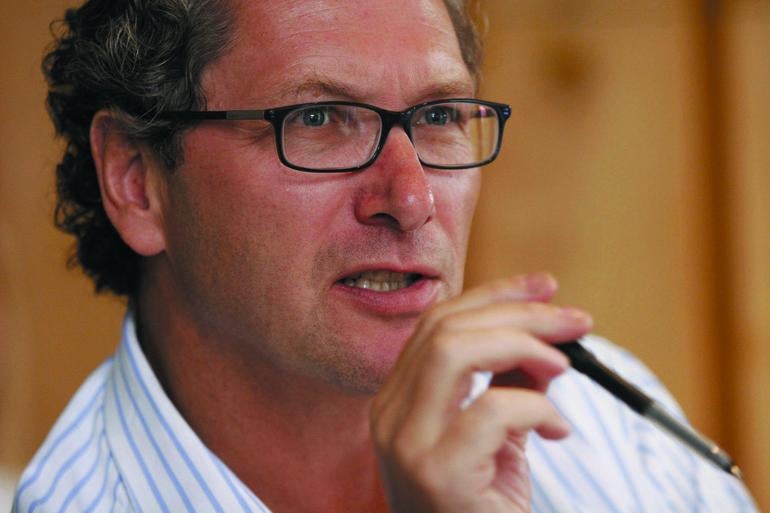
John Witherow, editor of the Sunday Times, last night admitted the move to restrict access to his newspaper’s online content was ‘a big gamble’but necessary to help meet Times Newspapers’ £100m editorial costs.
Rupert Murdoch’s move to introduce paywalls to the soon-to-be-launched new websites of The Times and The Sunday Times was, in part, a way to help support the printed tiles, Witherow said, in addition to helping develop future forms of journalism.
He was speaking as The Times revealed a first look at its new-look website, which borrows heavily from the design elements of the print edition.
Witherow said ‘the vast majority of readers’- perhaps more than 90 per cent – were likely to be lost once the paywall went up next month but that advertisers would be attracted by ‘a smaller core’of dedicated readers.
Witherow said that future digital content was likely to be funded through a “hybrid” mixture of ads and paid-access, adding that if readership was 100,000 behind the paywall that would likely bring in £10m revenue in subscriptions to the Sunday Times.
‘We understand it is a huge challenge and something of a gamble but we are caught up in a revolution and as a consequence of this there is a certain amount of chaotic turbulence going on,’he said.
‘Out of this comes the belief that you can charge for your newspaper in print, that you can charge for apps, but you put up all this digital content, plus extras, for free.
‘Personally, I never thought that this would be a viable financial model and we do need viable financial models because journalism is tremendously expensive.
‘The Times and The Sunday Times editorial budget is greater than £100m a year.”
The cost of The Sunday Times keeping a correspondent in Washington approached half-a-million pounds while The Times Baghdad correspondent was around £1m, Witherow said during a debate with Guardian editor Alan Rusbridger, which will be broadcast on BBC Radio 4’s Media Show later today.
‘If you put all your content up online for free you won’t be able to afford a Baghdad correspondent or to send people to Afghanistan,’Witherow told the audience at the Radio Theatre in Broadcasting House, London.
Rusbridger made the case for keeping a free access model, saying that the Guardian made around £40m annually from digital revenue and that its current growth rate is 100 per cent.
He questioned how much revenue could realistically be made if subscriber numbers were as low as 50,000 to 60,000 when the Guardian would be generating in the region of 2m readers each day.
Rusbridger said it may be ‘useful revenue’but newspapers ‘shouldn’t kid themselves that this is going to be the panacea”.
However, he conceded that if paywalls were successful the Guardian would have to consider implementation.
He said: ‘You’d be crazy to be fundamentalist about this.”
While some piracy was expected once the paywall was errected, Witherow said the relatively low cost of accessing the two websites – £1 for 24 hours or £2 for a week – was likely to help News International avoid content being wildly reproduced elsewhere on the web.
The BBC, however, did pose a significant threat to newspapers, he said, and risked putting people out of business now it was a web publisher: ‘The BBC has to decide whether it wants to compete with diversity in media”, he said.
Rusbridger said that while is was the best news organisation in the world, the BBC was “a pain in the neck”.
Admitting that Times Newspapers had been forced into making editorial cuts, Witherow said it had to take its ‘radical step’as new streams of revenue were needed to enable it to keep the best journalists.
He said: ‘We have to find a model where we don’t just lay-off journalists.”
Witherow admitted that The Times and Sunday Times risked being ‘cut out of the conversation’but said he feared websites that were solely ad-supported would be vulnerable to economic fluctuations.
A further danger of the ad-supported model, he said, was that if revenue slowly diminished it would create a poorer standard of journalism.
Email pged@pressgazette.co.uk to point out mistakes, provide story tips or send in a letter for publication on our "Letters Page" blog
